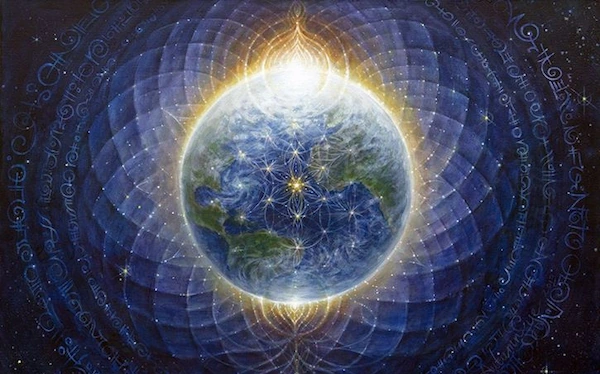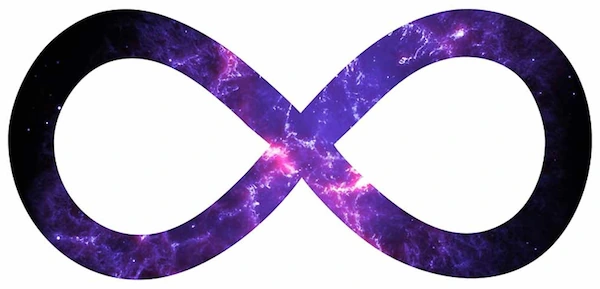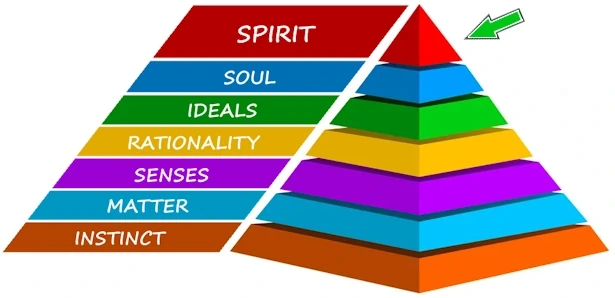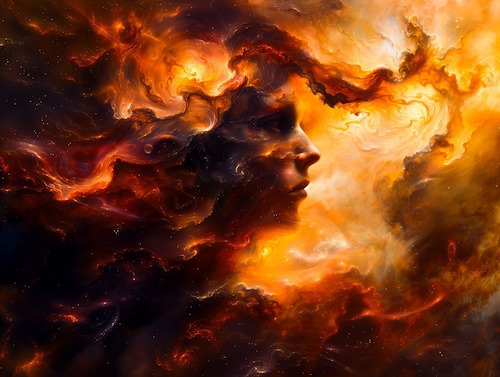
The question about the essence of awareness and consciousness represents a fundamental moment in the spiritual quest of the human being, one of those existential-flavored queries destined to be left without a definitive answer. These two concepts, rooted in the human soul, ethics and the ethereal component of being, concern the way we perceive and elaborate the reality around us, while at the same time providing energy to the process of spiritual evolution. Their understanding and distinction are crucial for those who aspire toward harmonious integration of body, mind, soul and spirit, since only by becoming aware of our complexity can we eventually rediscover the simplicity underlying our spiritual essence.
We will therefore explore the fundamental differences between consciousness and awareness, analyzing how each of them manifests in the individual’s inner journey, and then attempt to reunite them and make them one. We will delve into the nature of consciousness through a reflection on how it makes use of duality to experience and evolve, and discuss the process through which awareness develops, emphasizing the inherent significance of doubt and philosophical inquiry. Finally, we will provide some simple practical insights aimed at facilitating the integration of consciousness and awareness into the fabric of daily life, emphasizing their decisive role in personal growth and in gaining a better understanding of the unity between the individual, society and the whole universe.
The concepts of Consciousness and Awareness
Individual Consciousness
Consciousness, a complex and fascinating concept, is often described as an intrinsic property of human beings, which allows us to establish the boundaries of the self versus the non-self. In psychology, it is regarded as that which is accessible to conscious processing, clearly distinguished from the unconscious, which remains hidden and inaccessible to our awareness. This distinction between consciousness and the unconscious is necessary to understand the workings of the human mind.
However, conscience is not limited only to the psychological sphere. It also plays an important role in the moral realm, enabling us to create and distinguish moral categories such as good and evil. Conscience guides us in interpreting the world around us by detecting differences and similarities between one thing and another, thus highlighting its deep connection with knowledge and cognition. Consciousness work is primarily based on available information, so it is influenced by the place and time in which we find ourselves. It is through consciousness that we are able to reflect on our actions and take responsibility for them.
Zeitgeist (the spirit of time) and Individual Consciousness
To sum up, individual consciousness is a mental function that processes information by assigning it a dual and often moral connotation. People who do not distinguish right from wrong are commonly defined as lacking a conscience. Moral references are by no means innate, which explains why each culture produces different values. Individual conscience is heavily influenced by so-called common sense, which has the characteristic of varying according to place, historical era and predominant culture. What is considered right today may be forbidden tomorrow; similarly, individual consciousness does not possess absolute and universal properties.
Universal Consciousness
Then there is another, more subtle yet more important aspect of human consciousness: its connection with universal consciousness. Each of us possesses, or at least should possess, an individual consciousness influenced by social and cultural factors. However, there is a higher, non-individualized consciousness of which each of us is an expression. We can imagine this universal consciousness as a large sphere, capable, however, of subdividing into numerous micro-spheres, each of which has its own individuality while remaining connected to the mother sphere.
Is Universal Consciousness also constantly evolving?
Why does the universal consciousness feel the need to divide itself into so many small individual consciousnesses? Answering this question is not straightforward, as it is like trying to understand the operation of complex machinery by examining a single cog. The universal consciousness is the machinery, while we are the individual cogs. We are part of the whole, but unaware that we are so in most cases, therefore our perspective is very limited. The hypothesis we feel like proposing, is that the universal consciousness is also constantly evolving and that, in experiencing, it needs to manifest itself into many small consciousnesses in order to experience every tiny detail of creation. A kind of huge data collection, in other words.

Human being is a conscious animal (not always)
In this perspective, animals would also contribute to the collection of data and would also be endowed with some form of consciousness, but not with awareness. What distinguishes us from them is primarily the faculty of being self-conscious, that is, aware of possessing consciousness. The animal does not seem to be aware of itself and its existence; in fact, it does not conceive concepts such as birth and death, and its perception of time is different from ours. We know that one day we will die, and this heavily conditions our earthly existence. Let us try to imagine how different our lifestyle and way of thinking would be if we lacked the concept of death. Some people, without being aware of it, literally live in fear of death, and their every action seems to be aimed at pushing away as much as possible the thought that one day they will have to leave this world.
Definition of Awareness
Awareness, on the other hand, emerges as a form of self-consciousness, that is, the perception that we are distinct units characterized by our own uniqueness. As we said earlier, it involves recognizing that we possess consciousness and can produce thoughts; Descartes depicted this human characteristic with a sentence that has become famous: <<cogito, ergo sum>> – I think, therefore I am. This reflective capacity not only makes us present in the here and now, but also implies a deep understanding of that presence. It consists in knowing that we are alive and thinking, which underlies another basic concept, that of free will. Going back to the animal kingdom, of which human beings are also part for a good 99 percent, we seem to be the only creatures endowed with this faculty, while all others appear to be following instinct all the time.
Awareness and free will
While it is true that awareness is the basis of free will, it is also a fact that not everyone, not all the time, is willing to exercise it. 99 times out of 100, people proceed on autopilot, following standardized habits, rituals and behaviors, keeping their level of awareness at minimal standards, somewhat similarly to other animals. Awareness is higher when autopilot intervention is lower, and vice versa. Clearly, those who get totally carried away by daily life, filling themselves with commitments on the one hand and distractions on the other, possess limited free will, as their lives are set and directed toward predefined goals.
To Be or To Do – that is the dilemma
Paradoxically, a person who stays locked and still in a room all his or her life might be more aware, and therefore free, than another person who travels, works, raises children, engages in a thousand different activities, but never stops to ask himself or herself a trivial question: who am I? Indeed, we must understand that being endowed with consciousness does not imply making evolutionary use of it. Consciousness can also be put on standby for the entire duration of earthly life and perhaps even beyond. While it is true that awareness arises from becoming conscious of possessing consciousness, it is also equally true that the society in which we live does not ask us to develop a true individual consciousness, mostly limiting itself to impose its own on us.
First of all Be, then eventually Do
The choices we believe we make are in most cases imposed by the place, time and culture in which we are immersed. Returning to the example of a person locked in a room, one might wonder whether free will is actually related to not-doing rather than doing. Society requires us to make choices and stay in motion all the time, but at the same time it requires us to be mentally anesthetized and poor in critical thinking. Even many of the so-called “spiritual leaders” urge their followers to take concrete action and avoid passivity. However, are we really sure that it is actions that make the difference in terms of consciousness and awareness? Doing something is a human need, it serves to give meaning to earthly life, but perhaps what matters most is the degree of awareness with which we do or do not perform a given action. According to this logic, awareness comes before action and is not, as many would have us think, a consequence of it. So, free will and awareness, besides being profoundly interdependent, are primarily qualities of being rather than doing.
From Consciousness to Awareness
The differences between consciousness and awareness are essentially nested in their nature and way of expression. Consciousness, as an intrinsic phenomenon of being human, manifests itself independently of individual will, with no choice whether to be conscious or not. It is an automatic and uncontrollable process that constantly accompanies us in our life experiences. On the other hand, awareness requires active and intentional effort on the part of the individual. While consciousness can exist in a passive state, awareness always involves deliberate choice and active mental presence. It is through awareness that we can explore and better understand ourselves and the world around us.
The role of duality
In spiritual terms, consciousness uses duality as a tool to experience and enable the individual to explore and understand different states of being and nonbeing. This process of navigating between the different dimensions of inner and outer reality is vital to the development of awareness. In fact, awareness emerges as a process of progressive enlightenment, in which the individual gradually becomes more and more aware of the profound truths that reside within oneself and in the world around him or her. Such a path of inner growth is intrinsically linked to the power of doubt and philosophical inquiry, which stimulate the spiritual seeker to explore and better understand the complex interplay between mind, body, soul and spirit. Duality is a characteristic of the human mind, which needs to break down phenomena into multiple parts in order to better analyze them, but it should be emphasized that the separation between the various elements is purely illusory and virtual. On a consciential level, there is no opposition, but only complementarity.
The process of acquiring Awareness
In a nutshell, we could define awareness as our idea of universal consciousness. It is basically a process of interpreting reality that moves from the particular toward the universal, motivated by the inner need to reconnect with the unified, universal consciousness we mentioned earlier. We are already part of the Whole, but for some reason we have lost awareness of it, and now wish to recover it. The great sphere that has symbolically split into so many small parts now seeks to reassemble itself, giving rise to a mechanism of spiritual evolution based on rediscovering who we really are. This is why that trivial question that almost no one ever asks, either because they are too immersed in worldly things or because they are now hopelessly disconnected from the primal consciential source, becomes so important. The question, seemingly trivial, but which has the ability to trigger a process of gaining awareness, has always been the same since ancient times: who am I?
Mind, Soul and Spirit
If individual consciousness is primarily a mental function, awareness represents a window into the dimensions of the soul and spirit. It does not arise from earthly things; on the contrary, it transcends them by distancing us from them. The soul is the instrument that connects body and mind to the purely spiritual world. Direct communication between the material world and otherworldly dimensions is indeed impossible. Imagine a radio device designed to pick up certain frequencies and not others; in the same way, the human mind cannot intercept the frequencies of the spirit, but the soul can, posing as a conduit between the world of matter and the transcendental realm.

The Soul is our bridge to spiritual dimensions
The only problem is that the soul needs guidance, since it does not individually possess the awareness necessary to instruct the mind and re-establish connection with the higher realms. We can see the soul as a kind of child prodigy endowed with so much knowledge and an infallible memory, but in need of parental guidance to better understand what to do with his or her skills. The guidance needed by the soul is that of the conscious mind, while the spirit, or rather reunification with the spirit, is the goal to be pursued. We can mentally picture this quest as climbing a pyramid composed of several overlapping blocks, where the block above contains all the lower ones, exactly like a matryoshka doll. The spiritual level contains itself and all the lower ones, thus offering a greater level of awareness and unification. The pyramid shrinks as it rises upward and not the other way around, as would be logical to expect: this happens because greater awareness corresponds to greater simplicity. In short, everything that is not needed is left behind and the amount of “material” decreases rather than increasing. Among the things discarded are illusions, false beliefs, attachments and much more.
Becoming aware means remembering
Socrates, an ancient Greek philosopher who lived in the fifth century B.C., stated a concept that is as simple as it is fascinating: we already possess all the notions, but we have to remember them. Trying a computer analogy, we could describe our consciousness as a hard disk full of information but lacking the search function. The data are so many and so scattered that it becomes virtually impossible to retrieve them in a logical and understandable way. In order to recompose them in a rational way that makes sense, we need an index to help us understand where to go to find the data we are interested in. This index is generated by the soul part because of its connection with the spiritual worlds, yet the soul needs precise directions from the user in order to proceed. If the user enters misleading parameters, the soul will not be able to provide an accurate map of the territory.
The power of inner dialogue
Awareness is what arises from such a search process; we have already been in the territory under investigation, in fact, we are part of it in every way. The problem is that we lost much of our memory the moment we separated from the source of universal consciousness, while still retaining some scattered and incoherent memories. Socrates argued that through dialogue it was possible to recover, albeit with effort, that information which had fallen into oblivion. Socratic dialogue is to be interpreted in a broad sense, that is, as both inner and interpersonal conversation. In particular, inner dialogue represents the intimate conversation between mind and soul, where the mental part engages in asking the right questions and the soul part in producing the relevant answers. Resuming the computer analogy, the mind provides the search key, the soul generates the table of contents, and the resulting search process is awareness.
Awareness as a rediscovery of one’s origins
Everything finally makes sense. There is the mind, confused and constantly distracted by worldly affairs. There is the soul, endowed with great powers but unable to use them independently. There is universal consciousness, the original source of everything belonging to the spiritual realm. Finally, there is awareness, which is that process aimed at the reunification of these three elements seemingly separated from each other. Awareness is nothing more than an attempt to return to the origins, to the initial perfection, before the universal consciousness decided to divide itself into many smaller parts in order to explore and better know, fundamentally, itself.
Doubt and research at the basis of Awareness
So, what is it that serves as fuel for the development of awareness? According to the famous ancient Greek philosopher, it was one thing: doubt. Questioning everything, starting with the very things that everyone takes for granted, sparing nothing and no one. By carrying out this kind of philosophical research, one will soon realize that the certainties of this dimensional plane are mostly illusory and based on fickle elements, to say the least. Initially, one will feel a terrible sense of discouragement, as the world itself seems to be collapsing; later, as time passes and the investigation proceeds, the malaise will give way to disillusionment and then to a new form of awareness.
The timeless pursuit of Awareness
The veil of Maya mentioned by Arthur Schopenhauer will definitely fall, and the world’s grip on the soul will undergo a major downsizing. This process of spiritual evolution is described by various more or less colorful expressions, such as Spiritual Awakening, Enlightenment, Nirvana, Moksha, etc. Each of these designations refers to distinctive aspects of the path of consciential evolution, and it is interesting to note how each ancient culture developed its own vision of spirituality, as well as practical methods for leading an earthly life focused on inner evolution and preparation for death.
The link between Awareness and death
One of the most significant symptoms of spiritual evolution and the acquisition of a higher level of awareness is the revision of the concept of death. It is especially frightening because of our tendency to believe that it represents the end of everything. In reality, earthly life and existence are two separate things, which means that existence continues even after the end of earthly life, just as it subsisted before birth. The mistake we all make as beings embodied within a material form is to identify ourselves in our biological bodies. We are conscious, so we know, unlike other animals, that sooner or later the body will perish. Perceiving ourselves as a body even before we see ourselves as soul and spirit, makes us fear that the end of material life is the end of everything.
Death is a new beginning
The good news is that it is an unjustified fear! Soul and spirit are eternal, so it is only mind and body that die, at least until the next incarnation. In addition, it is worth specifying that the mind is, in a certain way, hard to die. This means that an individual firmly rooted in the ego and its supposedly earthly-type securities will tend to carry that burden with him or her even after leaving the body. <<As above, so below>>, and vice versa. It is therefore to be expected that a poorly aware person will tend to repeat the same choices cyclically since he or she is incapable of grasping possible alternatives. Similarly, we can imagine that a more aware individual has more free will, and that after departing from the earthly world he or she can see things more clearly and decide whether, and how, to eventually return to Earth.

Conclusion
Our metaphysical journey into the ethereal dimensions has clarified the link between mind, soul, spirit and consciousness, reminding us that every element in the universe is interconnected and that spiritual evolution involves the human being as a whole. It is inconceivable to speak about awareness without bringing up the concept of consciousness and subtle dimensions, just as it would be absurd to suggest enhancing the connection with one’s soul without first realizing that we are unitary entities only seemingly divided into multiple components. We have seen how the human mind divides and separates everything according to the principle of duality, doing so in order to facilitate the understanding of reality, but subsequently becoming a victim of the illusions that result from it.
Thereafter, it became clear to us that awareness does not represent a defined goal, but rather a potentially infinite path of search, the purpose of which is to reunify what has been illusorily divided by the mind that has fallen victim of its own misleading beliefs. Through recovering the teachings of Socrates, we understood the value of dialogue with both ourselves and others, becoming aware that we are already part of the Whole and that the answers are for that reason to be sought within ourselves, as long as we manage to ask the right questions.
Finally, we debunked the myth of physical death as the end of existence, reviewing it in the spotlight of a new awareness, where leaving the physical body simply takes on the connotations of a transition from one state of being to a different, though not necessarily more aware, one.
If you enjoyed this article with a transcendental flavor, you will surely find our personality tests with a spiritual setting intriguing as well. We recommend you try them now to test your level of spiritual evolution.
THE AWAKENING TEST
THE AWARENESS TEST
THE GREAT PERSONALITY TEST
MINI SELF-EVALUATION TEST: ARE YOU UNDERGOING SPIRITUAL AWAKENING?
Read the sentences below and select the ones you agree with and that you think make the most sense.
Count the number of boxes checked and read the corresponding profile.
0: You are sleeping soundly
1-2: You are sleeping but not completely
3-4: You wish to awaken but something is slowing you down
5-6: You are awakening
MINI SELF-ASSESSMENT TEST: ARE YOU IN THE WORLD OR OF THE WORLD?
This test gets its inspiration from the words of Jesus, according to the evangelist John:
<<If you were of the world, the world would love his own: but because you are not of the world, but I have chosen you out of the world, therefore the world hates you>>. This cryptic phrase with profound spiritual meaning can be summarized as follows: being in the world, but not of the world. So, do you think you belong to the world? Or do you feel you are here only passing through?
Read the sentences below and select the ones you agree with and that you think make the most sense.
Count the number of boxes checked and read the corresponding profile.
0: Most likely you are passing through IN the world
1-2: One part of you belongs to the world, another part does not
3-4: You almost certainly belong to the world
5-6: You belong to the world, or rather, you are OF the world
